Zambezi Read online
Chapter 1
Afghanistan
A dead place.
That’s how he thought of it. Nothing grew on the plain in front of him. Rock, dirt and dust. Even the target was made of mud, the once straight lines of the compound’s walls rounded by the ceaseless blasting of grit and wind. The backdrop was a mountain, jagged and welcoming as a chunk of razorsharp shrapnel, capped in bitter, lethal snow. The passable areas, the roads and the village pathways; the arable areas, the farms and the populated valleys, were home to seven million landmines.
The land was reflected in its people. Burned by searing summers, hardened in unforgiving winters, brutalised by warfare. Afghanistan didn’t have a monopoly on war and killing, it was just a market leader in both.
Master Sergeant Jed Banks blinked and rested his eye from the tiring one-dimensional blur of the view through his night-vision goggles. On the ground, he noticed, in the dust near his elbow, was a half-buried copper cartridge case, green with age. Probably from an AK-47. Maybe a Russian soldier had sat out here under a chilly star-studded night and watched the same medieval mud-brick compound. Maybe an Afghan shepherd had fired at a predator or a thief from a neighbouring village.
Perhaps a blood feud had been settled on this spot.
Here they resolved village disputes with assault rifles and mortars, celebrated weddings with a fireworks show of machine-gun tracer rounds, played a game on horseback with a dead animal instead of a ball. Sometimes, depending on who was at war with whom, they used a human instead of an animal.
Jed Banks was here to kill, too. He squinted into the sight of his M4 assault rifle again and scanned the squat tower at the corner of the compound once more. Maybe he would add to the never-ending tally of this country’s violent death toll tonight.
‘Do you think the US is achieving anything here?’ the man beside him whispered as he lowered himself to the dust.
The nasal drawl of the young Australian was a distraction for Jed – and not a welcome one.
Nothing good could come of having a reporter along on a mission like this. There was no movement around the compound or on the parapets. The guard in the tower at the north-east corner was still asleep. All was quiet and the snatch team was almost in position.
Jed glanced at the reporter. The man was short and weedy, with a goatee beard and an earring. He had carried a ruck on the walk in from the landing zone and Jed had made sure the stranger also humped the spare radio batteries and a couple of IV drips, just so they would get some use out of him.
He had stood up to the walk all right, though he still hadn’t been carrying near as much as the rest of them.
‘Hi, remember me from the briefing? Luke Scarborough,’ the reporter whispered.
Jed remembered the man, but ignored him. He scanned the wall again. The reporter worked for some wire service or other. AP, UPI, Reuters, some damn thing. Afghanistan was what was termed an acronym-rich environment. It was hard enough to keep up with the military abbreviations, let alone the media’s. He stayed away from the motley crew of journalists at Bagram. He resented having one forced upon the team, but CENTCOM – the US military’s Central Command in Tampa, Florida – was red hot on embedding journalists with all units, even Special Forces. Probably seemed like a good idea over drinks in the officers’ club. Out here in the dust, it sucked.
‘The captain said we’ll have to wait a while,’ hissed Luke. ‘About two hours. How do you pass the time?’
‘I sit quiet and do my job.’
‘Think about home?’
Jed turned and stared at the man. He didn’t get it. He was out on a big adventure, but couldn’t see that Jed and the rest of the ODA were totally focused on their mission every second they were out in the field. By contrast it seemed that everything the reporter had been told during the briefing about Operational Detachment Alphas – ODAs, or what used to be known in Vietnam and subsequently on TV as ‘A Teams’ – had gone in one ear and out the other.
‘Nothing to think about,’ he said, hoping this would shut the reporter up.
‘No one back home? No parents, no wife, no girlfriend? A boyfriend?’
‘Can’t you see I have a loaded weapon?’
Luke grinned.
Jed wiped his forehead with the back of his hand, mopping away the sweat with his black Nomex fireproof gloves. It was hot at this time of year in Afghanistan. A country of extremes, the reporters called it, and they were right about that. At the end of winter, when he’d started his tour, he’d been operating in the mountains and it had been bitterly cold, with snow on the peaks. Now, in August, it was sometimes over fifty degrees Celsius during the day and damn near as hot even at night.
‘A daughter.’ Immediately Jed regretted giving this away. He couldn’t help it, though. She was on his mind too much these days.
‘How old?’
‘None of your fucking business.’
The radio hissed in his earpiece. He held up a hand to silence the reporter.
‘Hawk, this is Snake, go.’
The reporter pulled out his notebook.
Jed listened intently for a few seconds, held the headset’s microphone close to his lips and whispered: ‘Roger that. Six, this is Snake. They’re in position. Show time is in two-zero mikes, over.’
Jed took another sight picture on the sleeping guard.
‘How old’s your daughter?’
‘I was hoping you had left.’
‘Give me what I want and I’ll get out of your hair.’
Fat chance, Jed thought. ‘She’s twenty.’
‘College?’
‘Was. She’s in Africa. Zimbabwe. Researching lions.’
‘Cool,’ Scarborough exclaimed.
‘Keep the fucking noise down.’
‘Sorry. But, hey, that’s interesting. That’s my usual beat – Africa. I normally work out of Johannesburg; I’ve just been up here for a few weeks covering for someone else. I’m going back next week.’
‘Don’t even think about asking for her phone number.’
‘She got a degree?’
‘Science. University of Massachusetts. She’s studying for her masters in wildlife conservation and working as a researcher while she writes her thesis.’
‘What does she think of you being over here?’
‘I don’t know. Proud, I guess. Not as proud as I am of her. She’s the only good thing in my life.’
‘Do you worry about her, being out in the wild in Africa? Zimbabwe can be pretty hairy.’
‘Thanks for the tip. But yeah, I do worry about her. She tells me it’s fine, though, so don’t spoil my illusions, OK, asshole?’
‘Sure. You’re the one with the gun.’
*
Luke chuckled to himself. He had got the soldier talking. That was ninety per cent of the job done. He had cracked the tough guy wide open and got his story.
He made some notes. The moon was full, so he could see enough to write. M/SGT Jed. The captain is the senior man, but Jed runs the team. 6′2″, broad shoulders; long, fair hair past his collar, bushy beard – the Special Forces types grow them as it gains them more respect with Afghan tribal elders. Crow’s feet at the corners of his eyes – sun-bronzed, weathered face. Veteran of Grenada, Somalia, Desert Storm, Kosovo. The last patrol of his tour. Daughter, aged 20.
‘What’s her name?’
‘Miranda.’
Miranda. Zimbabwe. Researches lions. The one person this soldier cares about. A little corny, Luke thought, but he’d finesse it a bit. Tough guy with a heart of gold always worked. He wondered what the daughter looked like. A blonde, if she took after her dad. Couldn’t be too many blonde, female American lion researchers in Zimbabwe.
Jed couldn’t stop himself from thinking about Miranda. He really did worry a
bout her. He was due out of this godforsaken dustbowl of a country in four short days. He had a ticket booked to Harare, Zimbabwe. He was going to spend four weeks of his leave with his baby girl and he couldn’t wait.
‘Where’s Miranda’s mom?’ the reporter asked.
‘Boston.’
‘And your unit is based in Fayetteville, North Carolina, is that right?’ He wrote it all down.
‘Yep. Work it out yet, genius? We split when Miranda was about three years old.’
‘How did it feel not being around when she was growing up?’
‘They teach you how to piss people off in journalism school, or does it just come natural?’
‘They teach us to ask loaded questions,’ Luke laughed. ‘Sorry. It must have been tough, being away from your kid. How come you’re so tight with her now?’
‘She found me. Looked me up a couple of years ago. She made the effort and I guess that’s why I love her so much. I always sent presents, called in on Patti maybe once or twice a year. There was no bad blood between us – not after the first couple years, anyway. Miranda reached out for me at a bad time – I hadn’t seen either of them for a while, and, well, she really helped.’
‘Why did you lose contact?’
‘None of your business.’
‘But things are good now?’
‘Couldn’t be better.’
‘Got a picture?’
‘Remember the weapon.’
‘Hey, I didn’t mean it that way.’
‘We don’t take anything personal out with us in the field. Nothing that identifies our families or loved ones, nothing they can use against us if we’re captured. You were told that during the brief. I don’t want to know what you’re carrying.’
‘I’m a reporter. No one’s going to harm me.’
It was Jed’s turn to laugh now. ‘You’re in civilian clothes – they’ll think you’re OGA, so they’ll torture you and kill you first. Give the rest of us time to escape.’ OGA – Other Government Agencies – was a euphemism for the CIA in Afghanistan.
‘Really?’
Jed shrugged. He’d had enough of the interview. A green shadow flickered in the night sight.
‘Six, this is Snake, over. We’ve got movement in the tower, I say again, we have movement in the tower.’
Jed’s voice was calm and matter-of-fact, as if he were asking for more chow in the D-FAC, the dining facility at Bagram, Luke thought. Luke hunkered down lower in the dust when he saw the muj in the tower stretch and yawn. He was picking up the Special Forces language quickly; a muj – short for mujahideen or holy warrior – was the common term for any Afghan adult male.
A goat bleated somewhere in the shadows at the base of the compound wall. The turbaned guard placed his hands on the earthen wall and looked over the edge. He straightened, scratched his beard and picked up his AK-47.
‘Six, this is Snake. Subject is moving. He has his weapon. Climbing down from the tower. I think he’s going to get that stray goat.’
‘What does that mean?’ Luke asked too quickly, giving away his rising panic.
‘Quiet, buddy Stay low and be cool.’ Jed reached over with his left hand – his right didn’t leave the pistol grip of his M4 – and patted Luke on the shoulder. He smiled and the Australian tried to force a grin back at him. Poor kid was shit-scared.
The captain’s voice came over the radio, asking for a situation report. Jed ignored him. He was more concerned about the snatch team, four men lying in the cover of some boulders not twenty metres from the compound.
‘Hawk, this is Snake,’ Jed whispered into the microphone. ‘Can you see the subject?’
The only reply was a single click that brought a burst of static. The signal meant yes, but also told Jed that the subject was probably close enough for the team not to risk speaking, even in a whisper.
The goat bleated again. Jed saw the Afghan, if that’s what he was, emerge from the shadow of the wall. He held his AK-47 by the barrel and whacked the animal on its rump.
‘Stay cool, Hawk,’ Jed whispered.
The goat did a one-eighty and scarpered towards the boulders. The guard laughed and turned to follow it. Instinctively he turned his rifle back the right way so the barrel was pointing forward again.
He walked to the boulders.
Jed pressed the switch on the black box fixed to the stock of his M4, activating his laser nightaiming device. He closed one eye and looked through the night-vision monocle strapped to his face.
The bright dot of the laser beam rested in the middle of the subject’s back.
The man stopped suddenly He brought his AK-47 up into his shoulder with the practised speed of an old warrior. Jed pulled the trigger and felt the recoil in his shoulder. The silencer muffled the noise of the round exploding from the barrel.
The Afghan pitched forwards and his rifle clattered against the boulders. A split second later the noise of a gunshot destroyed the night’s peace.
‘Jesus Christ,’ the reporter said.
Jed spoke into the mike again. ‘Subject is down. Hawk, what is your status? Repeat, what is your status? Who fired that shot?’
‘What’s happening, Snake, what’s happening?’ the captain hissed in Jed’s earpiece.
Jed was concerned now. It was going to shit. One of the guys in the snatch team, Murphy probably, who didn’t have a silenced weapon, had panicked when he saw the Afghan raise his rifle and fired a shot as well.
‘We’re fucked, Snake. We’re pulling out,’ said Kirby, the leader of the snatch team.
Jed knew there was no alternative. ‘Roger that. All call signs, abort. I say again, abort. Move to emergency LZ. Fall back through my position.’ Jed moved the mike away from his mouth and turned to Luke, whose face was a ghostly white. ‘Keep it together, man. As soon as the captain gets here, you go with him. I’ve got to wait here for the other guys. OK?’
Luke nodded dumbly.
Jed pressed his night-vision monocle against the aperture of his rifle scope again and saw the four men from the snatch team running back up the hill away from the compound towards him. The picture was lime-green and grainy, clear, but devoid of depth. Another movement caught his eye. First one, then two men appeared in the watchtower. They were struggling with a tarpaulin.
The captain and McCubbin, the team’s radio operator, appeared from Jed’s right, panting as they knelt next to him.
‘What happened, Banks?’ the officer demanded.
Jed ignored the stupid question. ‘Get Boss Man on the radio, Mac. It looks like they’ve got a Dooshka in the tower.’ Boss Man was the United States Air Force Airborne Early Warning and Control aircraft, orbiting unseen somewhere above them.
‘What?’
The radioman was thinking faster than the captain. He spoke rapidly into the handset of the radio he carried in his Alice pack. ‘Boss Man, Boss Man, Boss Man, this is Cougar one-five. Request immediate CAS, over.’
Jed saw the reporter had stopped taking notes and was balling his fists to try to stop his hands shaking. ‘It’s OK, Luke,’ he said softly. ‘We’re calling up some CAS – Close Air Support. They’ve got a Russian DSHK heavy machine-gun down in the tower, a Dooshka we call it. Just be ready to move if I tell you.’ The Australian nodded. Jed licked his lips to stave off the dryness in his mouth.
The weapon was probably older than himself, but it was built to last and the 12.7-millimetre rounds in its belt would tear a man in half.
Jed continued to watch the tower. ‘Get the Harriers on station, Mac. We need them close, but we don’t want to blow the whole place up if we don’t have to. There are women and children in the compound.’
The long barrel of the Dooshka swung up in profile momentarily as the two Afghans readied it.
Jed placed the point of the laser on the man on the left, whose torso was visible above the mudbrick wall. He squeezed the trigger again and the man careened backwards. The other man, however, was out of sight, presumably behind the weapon. ‘
I’d get down if I was you, Captain.’
The machine-gun opened up with a din like a giant striking an anvil five hundred and fifty times a minute. The heavy bullets split the air a couple of metres above the heads of the small group of Americans. Every now and then a green phosphorescent tracer round arced into the sky. The captain landed in the dirt beside Banks, sending up a cloud of dust.
‘Put some fire down, sir,’ Jed said to the captain. To the best of his knowledge it was the officer’s first time under fire. He was Special Forces, but a staff officer from CJSOTF – Coalition Joint Special Operations Task Force – headquarters. He’d been assigned to accompany the reporter and supposedly make sure neither Jed nor any of the other ODA team members said the wrong thing – like how much they resented having a newsman and a rear-echelon dude from HQ along for the ride.
The captain screamed at his radio operator. ‘Mac, call in the CAS. Wipe that fucking compound off the face of the earth. Now!’
McCubbin hesitated.
‘Don’t look at Banks, goddamn it! I just gave you an order.’
Jed ignored the screaming captain. The man behind the machine-gun had raised his head a little, desperately trying to see his target. The gunfire stopped. Jed placed the dot of the laser on the man’s head and pulled the trigger. The silenced rifle coughed. The pale-green face disappeared.
‘Sir,’ Jed said, ‘here comes the snatch team. Mac, call up the CH 47. It’s time for us to get out of here.’
‘On its way, Jed.’
‘Good man. Sir, we’ve silenced the gun for the time being. If you lead the men back to the emergency LZ I’ll tidy up here.’
The captain realised he had been overruled, but Banks had given him an out. ‘Right, you men, let’s go. Now! You too, Luke.’
Jed reached for his pack and unstrapped a sixty-six-millimetre light anti-tank weapon, a disposable one-shot rocket-launcher that was pretty well useless against modern tanks, but still handy for busting open buildings and bunkers. He slung his M4 and extended the telescopic case of the rocket-launcher. The weapon was not overly accurate and he needed to get closer to the compound.
There was enough explosive in the rocket to wreck the machine-gun if he could score a direct hit.

 The Cull
The Cull Blood Trail
Blood Trail Red Earth
Red Earth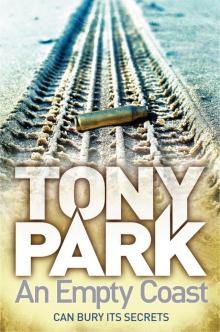 An Empty Coast
An Empty Coast Dark Heart
Dark Heart African Sky
African Sky The Delta
The Delta Captive
Captive Ivory
Ivory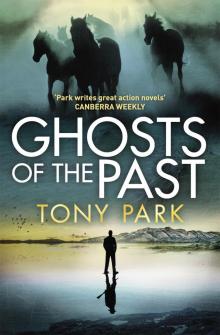 Ghosts of the Past
Ghosts of the Past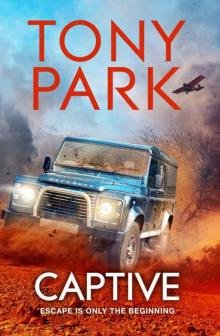 Captive_A High-octane And Gripping African Thriller
Captive_A High-octane And Gripping African Thriller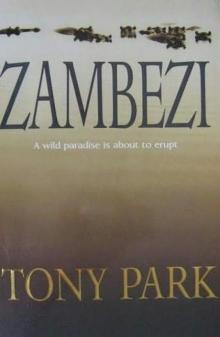 Zambezi
Zambezi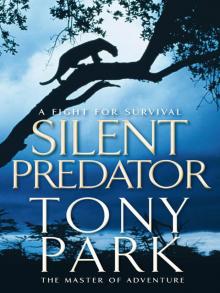 Silent Predator
Silent Predator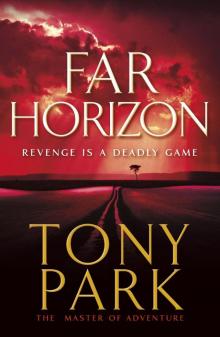 Far Horizon
Far Horizon African Dawn
African Dawn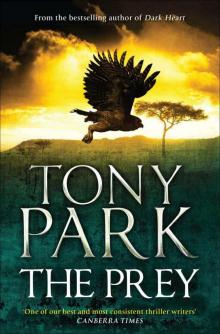 The Prey
The Prey Safari
Safari